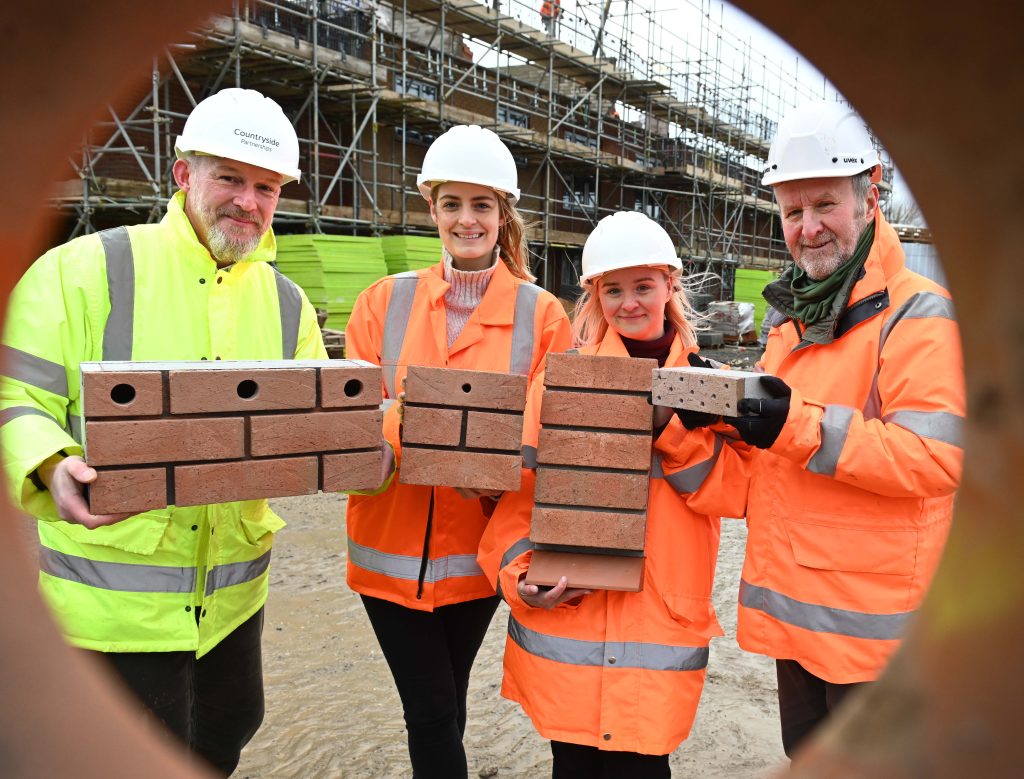A North East regeneration specialist, which is delivering homes for people with specific housing needs, is also boosting local wildlife and biodiversity.
As part of an ongoing drive to make ecological considerations in the design of its projects, Vistry North East is implementing various habitat enhancements at a development of apartments for people over 55, in Penshaw, near Sunderland and at an Extra Care project, in Guisborough, North Yorkshire.
Part of the Vistry Group, Vistry North East enlisted ecological consultants, Ecosurv, to offer pre-construction advice, expertise and ongoing guidance throughout the builds. Operating under its ‘Habibat’ brand, Ecoserv has developed a range of habitat features tailored for bats, birds and bees, which can be seamlessly built into brickwork. Each product has been developed in conjunction with relevant advisory organisations, such as The Bat Conservation Trust and RSPB.
Impressed by this habitat feature range, Wienerberger bricks, a key partner in Vistry’s supply chain, has allocated dedicated factory space in their UK facility to manufacture these units for use on new developments.
Across the two developments, Vistry North East is installing eight bat boxes – including three specifically designed for bats during the breeding season; six swift nesting boxes, five sparrow nesting boxes; five bumble bee boxes and ten bee bricks – which provide a host of varying sized nesting spaces for solitary bees. In addition, six open fronted nest boxes – to be installed in retaining walls at the development in Guisborough – will provide additional spaces for insects to live and thrive, boosting biodiversity.
Andrew Mayfield, Senior Design Manager, Vistry North East said: “The loss of habitat for our native wildlife has been a huge driver in the continued decline of many species across the UK. Swifts were added to conservation experts’ red list of the UK’s most endangered birds in 2021 and eight species of bee – a third of the remaining species we have – are currently listed on conservation priority lists, due to their large-scale declines in distribution. These are just two worrying examples.
“However, by thinking imaginatively, working with experienced and knowledgeable partners and implementing design features that create habitat and promote biodiversity, new development can make a positive impact – providing new spaces for animals to live and thrive.
“Our planning and site teams have gone the extra mile on both developments to maximise the opportunities presented and we will continue to explore opportunities to enhance the natural environment in the communities in which we build.”
Graham Jeffery, Managing Director, Ecosurv said: “Wildlife is in a state of decline across the UK with 41% of species reducing in number since 1970. The modernisation of building materials with new designs in recent years has meant that species which previously adapted alongside the built environment, have quite often become excluded from newer buildings. Operating nationally, we have partnered with Wienerberger to combat this problem by producing a range of eco-habitat solutions for a wide range of species including birds (swifts, starlings, sparrows, robins, wrens and redstarts) bats and bees.
“We are delighted to be working with Vistry North East on a number of projects across the region and have been impressed by its progressive approach to the issue of habitat creation on its developments.”
Paul Hodgkinson, Director of Business Development, Wienerberger, Said: “The collaboration between Wienerberger and EcoSurv is testament to the connection between sustainable development and the preservation of biodiversity. By creating spaces that provide opportunities for wildlife we can help reduce species decline across the UK.
“In July last year, MPs debated a call for swift bricks to be made mandatory for new housing development due to declining numbers – following an e-petition which gained more than 100,000 signatures. Eco-habitats allow developers to integrate features such as swift bricks aligning not only with future legislative changes but setting precedents for ecologically responsible development.”
At Penshaw Gardens, just off Station Road in the village, Vistry North East is delivering a complex of 72 apartments for people over 55, in collaboration with Sunderland-based housing association Gentoo Group.
At Guisborough, just off Spring Wood Road, a 83 unit extra care facility, for people with specific housing needs, is currently being constructed for Housing 21, a national provider of Extra Care and Retirement Living for older people of modest means.
Vistry North East is part of Vistry Group, the UK’s leading provider of affordable mixed tenure homes. A young and dynamic business with a Partnerships-led approach – delivered through the Countryside Partnerships brand – the Group is delivering thousands of homes every year for the affordable and private marketplaces. The Group also encompasses a portfolio of retail brands, including Linden Homes, Bovis Homes and Countryside Homes.
Vistry North East is currently active on 15 construction sites around the North East region with a gross development value of just over £630 million and is working with six housing associations and seven local authorities.


